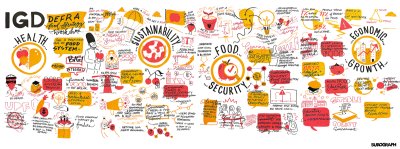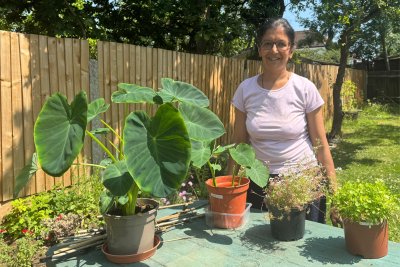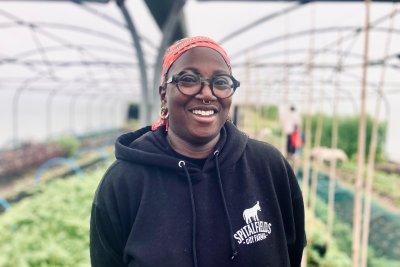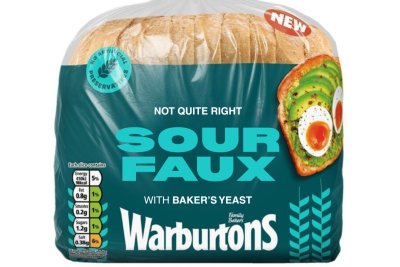.jpg) direct sales are one way to enhance outcomes - Growing Communities market credit: V Hird
direct sales are one way to enhance outcomes - Growing Communities market credit: V Hird
.jpg)
Farmers need power and money; it’s time for ambitious thinking on trading systems and investment
Farmers and growers need the power and money to enable the necessary decision-making, changes and investment for climate- and nature-friendly farming and high animal welfare. Let’s aim for a 25% market share for farmer-friendly food trading by 2030, argues Sustain’s Head of Sustainable Farming Vicki Hird
We need better, farmer-focused supply chains. For decades we have seen how concentration and centralisation of supply chains have pushed farmers and growers ever further from their consumers. They receive an ever dwindling share of the food pound, whilst intermediaries prosper, and have less say over how to run their farms and keep their animals whilst needing to deliver on environmental ambitions.
Supply chain regulation will help but we need more if we are serious about supporting farmers to be able to make a decent living from producing the healthy food we need, whilst also accelerating the transition to agro-ecological farming to tackle climate change and loss of nature.
Through the big changes currently in train, we do not want to lose more farms, abandoned or swallowed up by ever-larger units with bigger machinery, with less crop diversity, a handful of commodity crops used down the chain to create highly processed food, and less opportunity for nature to recover. Just since the 2016 EU referendum, England has lost 800 holdings – that’s at least 800 livelihoods and what the role they played in their rural communities.
This is not about preventing any changes in farming. But the worrying diminution in the diversity of farm structures and mosaic of habitats and land features that a healthy mix of farming sizes and types supports; critical for new entrants and progression, rural cohesion, biodiversity and landscapes.
We suggest there is a better way to run food supply chains than the highly centralised, just-in-time, globalised and concentrated systems built up over the past half century. Two issues lie at the heart of why farming is not able to produce the food we need whilst protecting nature and the environment and sustaining high animal welfare. They are these: money and power.
We need a better balance of power
Farmers and growers lack power in the supply chain. Sustain and our alliance members have worked for many years to champion regulated supply chains and to ensure the big retailers, manufacturers and other buyers deal fairly with farmers and growers. We have made headway with the Groceries Code Adjudicator and, hopefully, with new Fair Dealing measures emerging from the new Agriculture Act, which need to be rolled out fast. But regulation is slow and constrained in impact. It also does not directly improve farm-gate prices.
We need a better balance of money
Simply put, there are three sources of money in farming: the market; public money (subsidies, support, public procurement, etc); and investment. Our movement has done a fair bit of work to ensure public money goes to where it is needed, although there is still much to be done. Investment also needs work and Sustain has started to explore this and will work with others to look further at the right kind of investment.
On how the market values production - only 9% of the £120 billion value that is spent on food in the UK each year goes to farmers. And this will not shift without action. The lack of power of producers, highly centralised systems of processing, logistics and so on, all help to ensure money goes elsewhere.
We need better food trading
The many benefits of shorter, less centralised supply chains that sell direct or into local and regional markets are well known and understood. These include more jobs in smaller enterprises, reliable and appreciative market outlets for produce from diverse and ecological farms, and money circulating more in the community with less leakage. But these systems need to come out of the niche (and sometimes expensive) bracket and seriously challenge the major traders and procurement providers. Some, like the farmer-focused, values-driven Growing Communities, and their sister enterprises in the Better Food Trading network, are showing what they can achieve linking consumers more directly with seasonal supply from sustainable producers, through fair and ethical trading systems, offering huge economic, community and environmental benefits and a living wage for all involved.
Let’s think ambitiously. Our times need it. I would like to suggest a target of 25% market share for non-multiple, non-chain food supply by 2030. This is, of course, hugely ambitious given the current level which is around 2-3%, against the huge capital tied up in existing systems, the problems facing the farm sector, and the massive power of the big players.
I believe such ambition is necessary. And whilst challenging, I think it is possible, and its time has come. Such a shift to shorter chains will only happen via investment - in better and local supply chains, infrastructure, logistics, hubs, promotion, skills and training. Farmers and growers have more power together so investment in cooperative and collaborative approaches and marketing would allow them in turn to invest in environmentally friendly and higher welfare farming and provide healthier and less processed food to far more consumers. The loss of the smaller scale abattoirs is a high profile and very serious example of how we’ve let the systems that once enabled this to decline. We need to support the strong campaign for more local, smaller and even mobile abattoirs and cutting facilities.
We need better supply chains and infrastructure
In a more farmer-focused supply chain, we also need to be cutting out the places that drain money out of the system, undermining opportunities to make progress on sustainable farming:
- unnecessary intermediaries and contracts that undermine farmers
- shareholder dividends
- excessive executive salaries
- offshore tax havens and hedge funds
We need to put the money to better use, diverting current finance to invest in farmer-focused infrastructure and better routes to market:
- Public money, for instance the billions promised in the UK Shared Prosperity Fund, which may reach Local Enterprise Partnership (LEPs); the new Agriculture Transition Plan funds
- Private money, capitalising on the new interest in innovative finance, with lots of investors keen
Investments in infrastructure could include new sorting, milling and storage capacity, abattoir and cutting room facilities, new farmer-focused trading platforms and consumer-convenient retail, and so on and in each county. It could help with low- or no-interest grants for electric vehicles, facilitating collaborations and joint ventures, investment in dynamic procurement models for public procurement, and more.
Investment in line with public values could also require payment of living wages and fair treatment of workers, so that the food supply chain is stimulated to play its part in ensuring that lower-paid workers – including farm, packing and food processing workers - can in turn afford to feed themselves.
We need to counter the flawed assumption that food needs to be ever cheaper in order to be accessible to people with low incomes, many of whom work in the food industry. Policies based on a ‘cheap food’ model fuel a downward spiral of in-work poverty and squeezed food suppliers less able to invest in their product standards or their people. Interesting to see European groups calling for worker conditions to be part of agriculture policy reforms.
Also needed is new capacity to provide independent and affordable guidance and advice on the opportunities and challenges, the business management and digital skills these new models can bring and aligned with the environmental changes needed in farming. Many farmers who are already doing this kind of operation could be paid peer advisers, providing another source of income and bringing invaluable connections, expertise and authenticity.
We need better regulation
Let’s not forget regulating supply chains. Alongside the multiple retail code (GCA), we need new supply chains rules, through new, sector-based, and well-enforced statutory codes of practice to make big food buyers have to play fairer. We must see an end to highly unfair demands on suppliers, with regulators able to apply effective penalties and require adequate redress.
What shall we do about it?
The Sustainable Farming team that I head up will be working to create opportunities and overcome barriers relating to investment, new infrastructure development and better, fairer and farmer-focused supply chains. It will take many allies working in common cause and understanding the part each plays. We will listen to what farmers need, explore options for new and better investment (private and public) and foster collaboration and lobbying for the policy changes required. We need a new era of successful, significant regional food systems that work for farmers, the climate, nature, consumers and society. We have also recently launched work to support peri-urban farming linked to better food trading. This will all be alongside wider Sustain work on local authority and community actions (with our Sustainable Food Places network), trade policy, procurement standards and food strategies.
To get involved, sign up to the newsletter and follow Vicki Hird (@vickihird) and James Woodward (@James_pWoodward ) on twitter.
Sustainable Farming Campaign: Pushing for the integration of sustainable farming into local, regional and national government policies.
Sustain
The Green House
244-254 Cambridge Heath Road
London E2 9DA
020 3559 6777
sustain@sustainweb.org
Sustain advocates food and agriculture policies and practices that enhance the health and welfare of people and animals, improve the working and living environment, promote equity and enrich society and culture.
© Sustain 2025
Registered charity (no. 1018643)
Data privacy & cookies
Icons by Icons8







